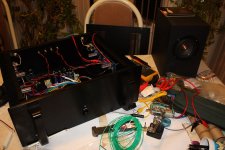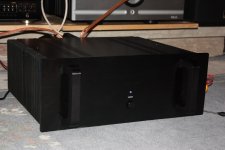Albertli...
I've just completed an F6 build for a friend.
I'm using 6.2v zeners, R7 R8 are 3.3k, And the trimpots are 30 turn (supposed to be 21 turn).
On initial power up I had the same symptoms as you.
No Bias reading across R2 (0.47) or R1 (0.56).
And DC offset was all over the place.
Thats with both trimpots centered.
The Bias and DC trimpots seemed to do nothing.
Voltage across the zeners are 6.195 and 6.21.
I read and used William2001's suggestion of reading the voltage across G/S of Q2.
Doing that I could see the Bias trimpot does alter the voltage.
It started at about 300mv and as I wound the Bias pot up, the g/s voltage raised until about 3v where the bias finally started to raise as well.
At about 4-4.5v across g/s, the bias should be very close to where you want it.
The amp is now sitting there at 0.55v (Bias across R2) and under 3mv offset.
I hope yours is just suffering the same issue of just needing to be adjusted.
PS, Many thanks to William2001 for unknowingly help me get mine running 😉
I've just completed an F6 build for a friend.
I'm using 6.2v zeners, R7 R8 are 3.3k, And the trimpots are 30 turn (supposed to be 21 turn).
On initial power up I had the same symptoms as you.
No Bias reading across R2 (0.47) or R1 (0.56).
And DC offset was all over the place.
Thats with both trimpots centered.
The Bias and DC trimpots seemed to do nothing.
Voltage across the zeners are 6.195 and 6.21.
I read and used William2001's suggestion of reading the voltage across G/S of Q2.
Doing that I could see the Bias trimpot does alter the voltage.
It started at about 300mv and as I wound the Bias pot up, the g/s voltage raised until about 3v where the bias finally started to raise as well.
At about 4-4.5v across g/s, the bias should be very close to where you want it.
The amp is now sitting there at 0.55v (Bias across R2) and under 3mv offset.
I hope yours is just suffering the same issue of just needing to be adjusted.
Ya there you go. Q2 has no current flowing through it. I would put clip leads on Q2 gate and source, and verify that I can adjust the gate voltage with the pot. At 4 or 4.5 volts, the transistor should turn on. Watch current through the .47 with clip leads on each side of it. Current=voltage divided by resistance.
Sorry, should have said G to S. I'm a dummy that was typing way too fast at the end of lunch break. Q2 may be defective, I don't know. Assuming good rail voltages and working bias, adequate Vgs should get current flowing through the thing. Again, I would have clip leads on each side of the .47 and watch for voltage there as I increase Vgs to get the transistor to start flowing current. 2.5V is a good starting point for gate to source.
PS, Many thanks to William2001 for unknowingly help me get mine running 😉
Last edited:
Hey that's great! Hopefully Albertli gets his going. I converted my own Aleph J monoblocks over to F6's about a week ago. I've also had BA-1 and F5's in there. The F6 is a very nice amp, some of the best sound I've had so far.
Last edited:
I've also had BA-1 and F5's in there also. The F6 is a very nice amp, some of the best sound I've had so far.
How do you compare the F5 and F6?
Well my memory is far from perfect and I'm not a very good audio reviewer, but... I built the F5 probably 3 years ago, I used Toshiba outputs, no current limiting, and applied EUVL's J74 input degen trick. I remember that amp having really good treble mainly. It sounded nice overall and I used it for probably a year. This F6 is certainly a better amp. Just really engaging to listen to, it's hard to explain. It really lets all the information through. If the source and/or source material aren't very good, it tells you that. More so than the other amps I've had. The single ended BA-1 I built certainly has some magic, but these push pull amps are really a better fit for my own speakers. This F6 is really stable and well behaved, starts up gentle, and I can't really find much fault with it as I listen 2 or 3 hours every night before going to bed. Sounds fantastic so I think it's staying for awhile... Only thing I miss is not having a balanced input, my dac (Buffalo 2 / Legato 2) sounds a little better using the balanced output.
Well my memory is far from perfect and I'm not a very good audio reviewer, but... I built the F5 probably 3 years ago, I used Toshiba outputs, no current limiting, and applied EUVL's J74 input degen trick. I remember that amp having really good treble mainly. It sounded nice overall and I used it for probably a year. This F6 is certainly a better amp. Just really engaging to listen to, it's hard to explain. It really lets all the information through. If the source and/or source material aren't very good, it tells you that. More so than the other amps I've had. The single ended BA-1 I built certainly has some magic, but these push pull amps are really a better fit for my own speakers. This F6 is really stable and well behaved, starts up gentle, and I can't really find much fault with it as I listen 2 or 3 hours every night before going to bed. Sounds fantastic so I think it's staying for awhile... Only thing I miss is not having a balanced input, my dac (Buffalo 2 / Legato 2) sounds a little better using the balanced output.
Thank you for letting us know your experience with the F5 and F6 amplifier!!
Would you please let us know what type of fet you use in your F6 IRF type or SIC
Thank you!
Greetings
My computer box F6
It looks ugly, but it sounds good, very good.
Thanks everybody for all the helps. I don't know how to tell the sound. I like it and I like the imaging that it creates. It runs at 1.3A for almost 10 hours today with only 38c at heat sink. I love this more than my F5.
Lovely amp.
It looks ugly, but it sounds good, very good.
Thanks everybody for all the helps. I don't know how to tell the sound. I like it and I like the imaging that it creates. It runs at 1.3A for almost 10 hours today with only 38c at heat sink. I love this more than my F5.
Lovely amp.
Attachments
Last edited:
It looks ugly, but it sounds good, very good.
Thanks everybody for all the helps. I don't know how to tell the sound. I like it and I like the imaging that it creates. It runs at 1.3A for almost 10 hours today with only 38c at heat sink. I love this more than my F5.
Lovely amp.
Looks pretty good to me.
Great to hear you got it going.
Just for reference, What was the cure for the problem you had ?
Thank you for letting us know your experience with the F5 and F6 amplifier!!
Would you please let us know what type of fet you use in your F6 IRF type or SIC
Thank you!
Greetings
IRFP240
This F6 is really stable and well behaved, starts up gentle, and I can't really find much fault with it as I listen 2 or 3 hours
every night before going to bed. Sounds fantastic so I think it's staying for awhile..
Thanks very much, I'm building an F6 right now.
Looks pretty good to me.
Great to hear you got it going.
Just for reference, What was the cure for the problem you had ?
Exactly what you did.
After working on and off on this for the last 5 months, I finally
powered up the F6 last night. The only problem seems to be that I
had soldered one of the on-board LEDs backwards. 😱 I don't think
I will bother fixing that.
It still needs a little bit of work; the dc offset is a bit high (20mV)
since I made the initial adjustment before the amp was fully heated up.
Anyway, it's playing and sounding pretty good. 🙂
A big thank-you to Mr. Pass for this wonderful gift. And thanks also
to Jim for the build guide.
Cheers,
Dennis
powered up the F6 last night. The only problem seems to be that I
had soldered one of the on-board LEDs backwards. 😱 I don't think
I will bother fixing that.
It still needs a little bit of work; the dc offset is a bit high (20mV)
since I made the initial adjustment before the amp was fully heated up.
Anyway, it's playing and sounding pretty good. 🙂
A big thank-you to Mr. Pass for this wonderful gift. And thanks also
to Jim for the build guide.
Cheers,
Dennis
Attachments
It is not a lot of trouble removing the led and reversing it. You will probably be able to do it without removing the board. Just heat the lead from the top. The worse that can happen is you destroy the led but I have had to change many in my builds and always saved the led. Lowering the dc offset is easy too but 20mv is not a real concern either. I think you will find the bias will need to be adjusted after a few days of using as well. Wait a few days and recheck it. It is a simple adjustment.
Dennis - Fantastic! Congratulations! It looks wonderful!!
Is that a VT4C case? I've used them before, quite nice.
More photos when you get a chance!!!
🙂 🙂 🙂
😀 😀 😀
Is that a VT4C case? I've used them before, quite nice.
More photos when you get a chance!!!
🙂 🙂 🙂
😀 😀 😀
so , there is B1 revamp iteration ?
Yes. This is correct.
I haven't seen the circuit but my understanding is, it is very similar to the push pull jfet buffer in the sony vfet pt1 article.
If anyone can add further information on the new B1 buffer that would be great.
Very nice Dennis - happy listening days ahead
I have a question - where can one find an ON/Off push switch like on Dennis's amp
I currently have a toggle, but much prefer a push ON/Off
FR
I have a question - where can one find an ON/Off push switch like on Dennis's amp
I currently have a toggle, but much prefer a push ON/Off
FR
Thanks for the kind words!
The case is from vt4c and I removed the front lettering with a sugar cube.
I'll tweak the dc offset a bit after using the amp more. Unfortunately I
probably won't really get a chance to play with it until closer to
Christmas.
Vince, it's a 30.8.
Cheers,
Dennis
The case is from vt4c and I removed the front lettering with a sugar cube.
I'll tweak the dc offset a bit after using the amp more. Unfortunately I
probably won't really get a chance to play with it until closer to
Christmas.
Vince, it's a 30.8.
Cheers,
Dennis
- Home
- Amplifiers
- Pass Labs
- The diyAudio Firstwatt F6


